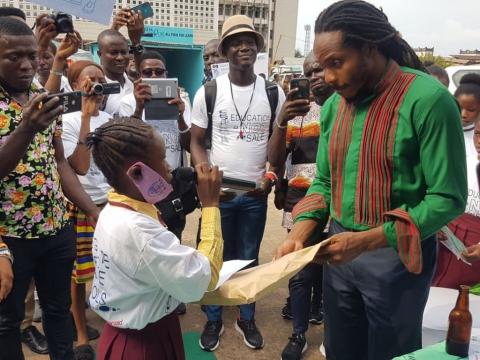By Kemo Cham
Campaigners for affordable and quality education have called on the Sierra Leone Government to regulate private schools and refocus its invest in public schools to bridge a gap occasioned by overconcentration on the former.
The call was made by a consortium of Civil Society Organizations (CSOs) and Non-Governmental Organizations (NGOs), under the Education Spikes Campaign. The activists say investment in public schools is important to encourage children to go to the school of their choice and not be limited because of high fees charged by private schools.
The Education Spikes Campaign is championed by the Community Action to Restore Lives (CARL), which is collaborating with other consortium members including Education for all Sierra Leone Coalition, OXFAM, and Action Aid. The group says the move is part of its efforts to support the government’s flagship Free Quality Education (FQE) programme, with the goal of ensuring that it remains committed to it.
The campaign, which was launched at the Miatta Conference on Friday, 11th December, coincided with the end of the Education Week, which began on 7th December.
The goal of the campaign, according to its proponents, is to achieve mass exodus of pupils and students from private to public schools. They intend to achieve this by influencing government policy for non-privatization of public schools.
The consortium says the Sierra Leonean public is supporting the call for non-privatisation of public schools. And at the launch, leading local artists, including Marie Vee, Star Zee, and Lord Mo, where unveiled as supporters of the campaign.
Present at the occasion were the ministers of Information and Communications, Mohamed Rahman Swarray, Dr David Moininah Sengeh of Basic and Senior Secondary Education and Prof. Aiah Gbakima of the Technical and Higher Education. Also present was the head of the Teaching Service Commission (TSC), Dr. Stanella Beckley, all of whom signed up to the campaign.
As part of the overall goal, the consortium is advocating for the regulation of “for profit private schools” in the country, the concept note of the campaign, a copy of which was obtained by Politic, notes.
In it, the campaigners cite a 2013 survey, which they say entailed evidences to backup their case, revealing, among other things, that the bulk of children were enrolled in private schools, many of which received government assistance.
They also cited a 2016 meeting of the National Education Board with owners of private schools, where Professor Sahr Thomas Gbamanja, the then chairperson of the board, lamented that fees charged by private schools were not commensurate to the service they provided.
According to the campaigners, the FQE afforded all children access to basic education, noting that “it was a relief for parents and show of willingness on the part of government to deliver on international obligations.”
The campaign group also cited the school census conducted in 2019 which indicated a national 4% increase in the number of schools, with 7.8% at pre-primary, 2.3% in Primary, 6.7% in Junior Secondary and 7.4% in Senior Secondary. They said a report by the Ministry of Planning and Economic Development on progress in the implementation of the Medium – Term National Development Plan of 2019 also revealed a lot of unmet targets in the Education Cluster.
“From the above, we see that government faces lot of challenges in delivering equitable and quality education for all. These have connections to the fact that the management of 85% of schools are in the hands of different categories of private providers,” it says.
The group lamented that there is the sustained poaching of qualified teachers by especially for-profit private schools thus, ridding public schools of qualified teachers.
The consortium therefore called on the government to invest in teachers by improving and cleaning of teachers’ data and allocation of qualified teachers to rural areas. It further called for support for the TSC, specifically to “arm them with iron teeth to bite and take required actions.”
It said the Ministry of Basic and Secondary Education should set up a separate unit within it, charged with the responsibility to approve, monitor and regulate the activities of private education providers. The World Bank and other donors could also help by ensuring that development aid for education to the Government of Sierra Leone is used to support the public provision of free, quality education that benefits all without discrimination of any kind, such as discrimination based on socio-economic disadvantage, gender identity, race or disability.
The Civil Society too could help by popularising the Abidjan Protocols for government to take ownership for the provisions of quality public education as a fundamental human right for every Sierra Leonean child, whether rich or poor, disabled or abled, male or female.
Copyright © 2020 Politico Online








